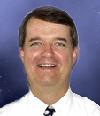Oral disease a clue to potential health problems
by Michael BakerPublic Relations
If the eyes are the windows to the soul, the mouth may be the door to health. When it comes to a patient’s physical condition, dentists can tell a lot with just an oral examination.
 Dr.
Brad Neville
Dr.
Brad Neville
Brad Neville, DDS, director of MUSC’s Division of Oral Pathology, is well aware of what a dental checkup can reveal.
“In oral pathology, we help diagnose and manage patients with oral diseases,” he said. “We analyze biopsy specimens from other clinicians and also examine patients with potential health problems.”
Neville’s passion for his career is evident. Besides contributing articles to various medical journals, he’s the primary author of two oral pathology textbooks, including one that arguably is the most widely used in United States.
His dedication to his field culminated in his recent selection as president-elect of the American Academy of Oral and Maxillofacial Pathology. The specialty organization, comprised of more than 600 oral health care providers across the nation, promotes awareness of oral diseases among clinicians outside its specialty area.
“Oral pathologists make up a very small group, relative to other dentistry specialties,” Neville said, “so we try to let patients and our colleagues know that we’re here.”
Currently, Neville and new MUSC faculty member Angela Chi, DMD, comprise South Carolina’s entire workforce of oral pathologists. Still, the MUSC division handles numerous requests from all over the United States.
“We get specimens from offices in the Carolinas, Georgia, Tennessee, and Florida,” he said. “But we also get requests from as far away as Pennsylvania, Ohio, Texas, and Idaho.”
He added that in 1980, when he first arrived at MUSC, the division received around 1,000 biopsy specimens each year. This year, the number should reach more than 4,000.
Closer to home, Neville addresses local dental society groups, showing them what to look for when conducting a typical checkup. At MUSC, he teaches dental students how to diagnose oral diseases, especially oral cancer.
“South Carolina has the country’s second-highest death rate from oral cancer,” he said. “Unfortunately, a lot of the cancer we identify has progressed into the later stages of its growth. That’s why it’s so important for dental students to identify the early, premalignant signs of cancer.”
With that in mind, he teaches about pre-cancerous signs—like white or red patches called leukoplakia and erythroplakia, respectively—that warn of future problems.
The key, he says, is getting students and dentists to pay attention to the details.
“Late-stage cancer cases are easy to diagnose, but the oral cavity often provides less obvious signs of early lesions,” Neville said. “We need to look for these early clues to prevent the development of invasive carcinoma, encouraging our patients to stop any habits that contribute to their risk of developing cancer.”
But the job of an oral pathologist isn’t simply to look for signs of mouth-related diseases. Neville asserted that other illnesses often manifest through oral symptoms.
“In a lot of situations, dentists can diagnose diseases specific to the oral cavity,” he explained, “but people often forget that the lining of the mouth is more or less an extension of the skin, so we can diagnose dermatological and systemic diseases based on their oral manifestations as well.”
As examples, he cited illnesses such as anemia, inflammatory bowel disease, leukemia, and even HIV. His division also works with the Department of Otolaryngology to diagnose instances of head and neck cancer.
“Many people see their dentists more often than their physicians,” he said, “so we need to recognize potential health problems that otherwise may go undiagnosed.”
Friday, July 9, 2004
Catalyst Online is published weekly, updated
as needed and improved from time to time by the MUSC Office of Public Relations
for the faculty, employees and students of the Medical University of South
Carolina. Catalyst Online editor, Kim Draughn, can be reached at 792-4107
or by email, catalyst@musc.edu. Editorial copy can be submitted to Catalyst
Online and to The Catalyst in print by fax, 792-6723, or by email to petersnd@musc.edu
or catalyst@musc.edu. To place an ad in The Catalyst hardcopy, call Community
Press at 849-1778.